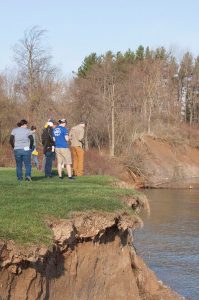Climate science is inherently interdisciplinary, involving both the physical and biological sciences. However, there is flexibility within the minor for some specialization, depending on the student’s major interests. Climatologists come from the ranks of geologists, oceanographers, geographers, biologists, chemists, physicists, and meteorologists. The commonality among these disparate fields is that they all inform us about the earth’s ability to absorb and radiate energy, and the way atmospheric processes play out across the earth’s surface. This minor would serve students who might be going on to graduate work in on of the subfields of climatology or those who wish to be more informed in ongoing debates about climate change.
The minor requires sixteen to eighteen (16-18) credits. Consult the current Academic Catalog for full details. Please see Dr. Nicholas (Monroe 314; jnichola@umw.edu) for more information.
Three courses are required:
- GEOG 110 – Introduction to Weather and Climate with lab (4 credits)
- GEOG 325 – Dynamic Climatology (3 credits)
- Either GEOG 327 – Climate Change (3 credits)
- Or EESC 355 – Icehouse-Greenhouse Earth (3 credits)
Take two or more electives from the following, totaling at least six (6) credits, with at least one course at the 300-level:
- BIOL 210 – Introduction to Ecology and Evolution (3 credits)
- CHEM 331 – Environmental Chemistry (3 credits)
- EESC 112 – Evolution of Earth (3 credits)
- EESC 210 – Oceanography (3 credits)
- EESC 230 – Global Environmental Problems (3 credits)
- EESC 325 – Environmental Geochemistry (4 credits)
- GEOG 111 – Landform Processes (4 credits)
- GEOG 245 – Environment and Society (3 credits)
- GEOG 326 – Glacial Geomorphology (3 credits)
- PHYS 201 – Thermodynamics and Statistical Mechanics (3 credits)
